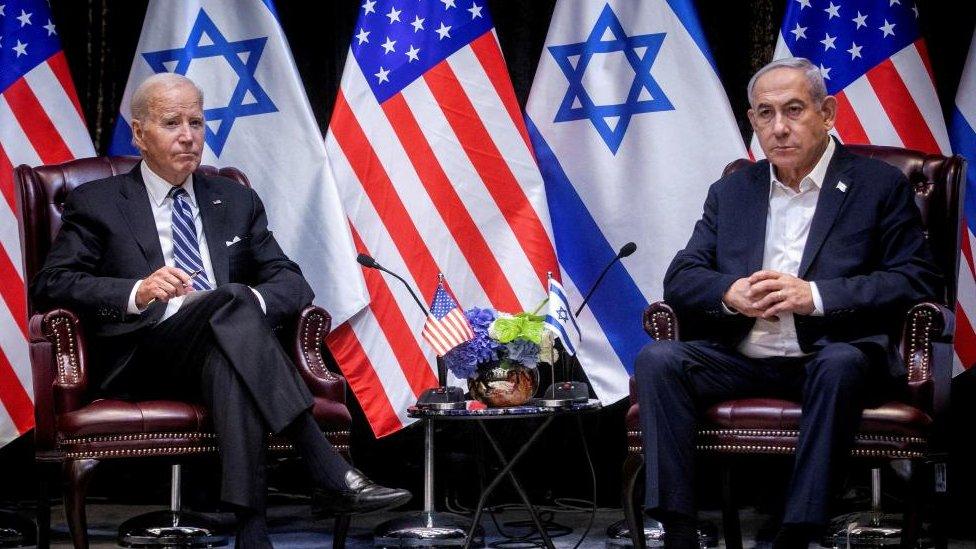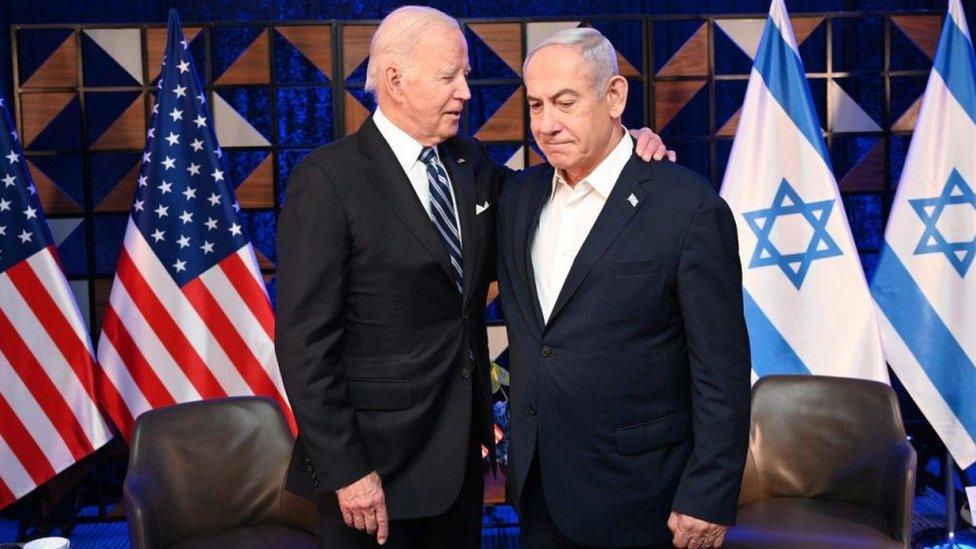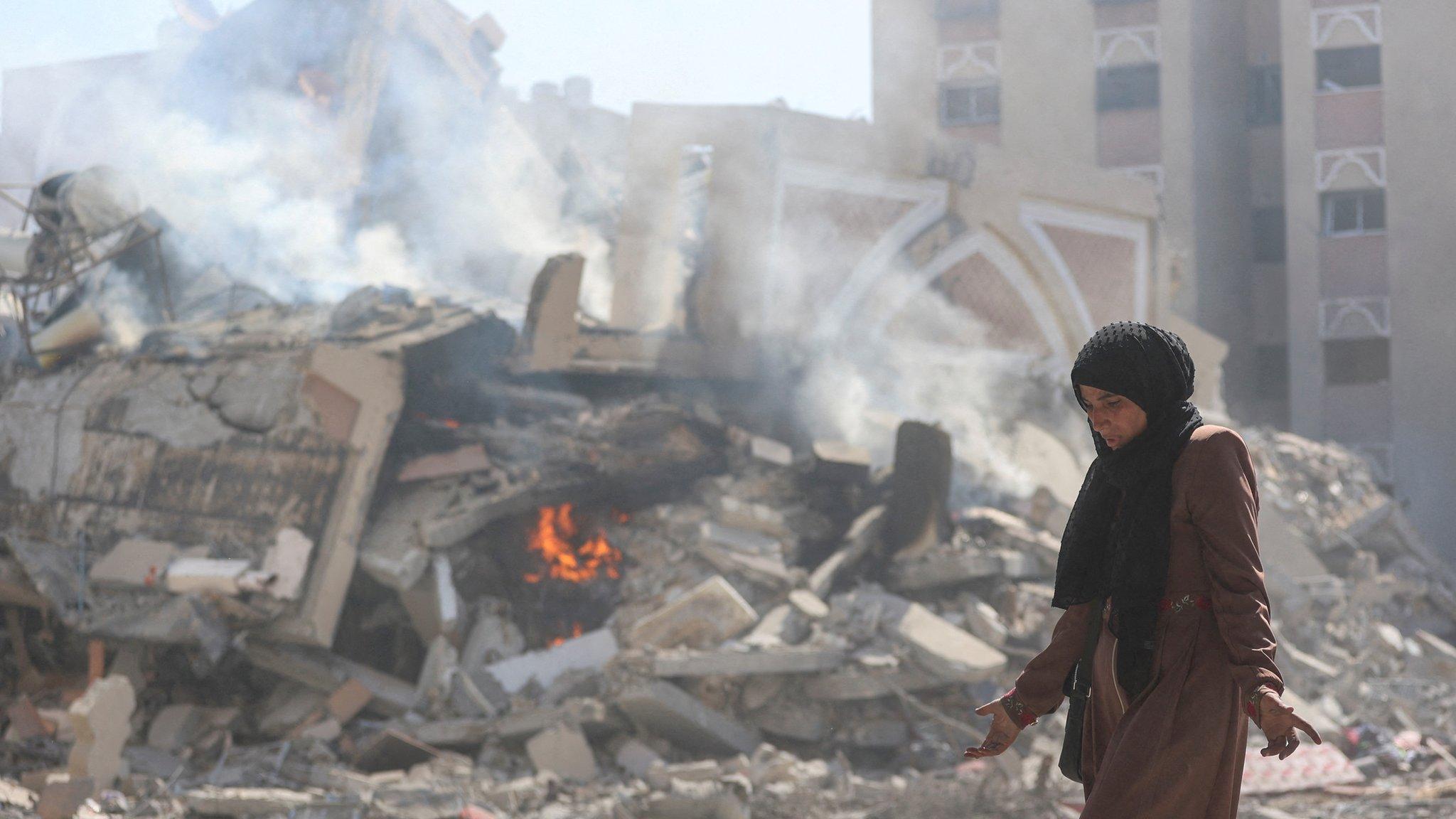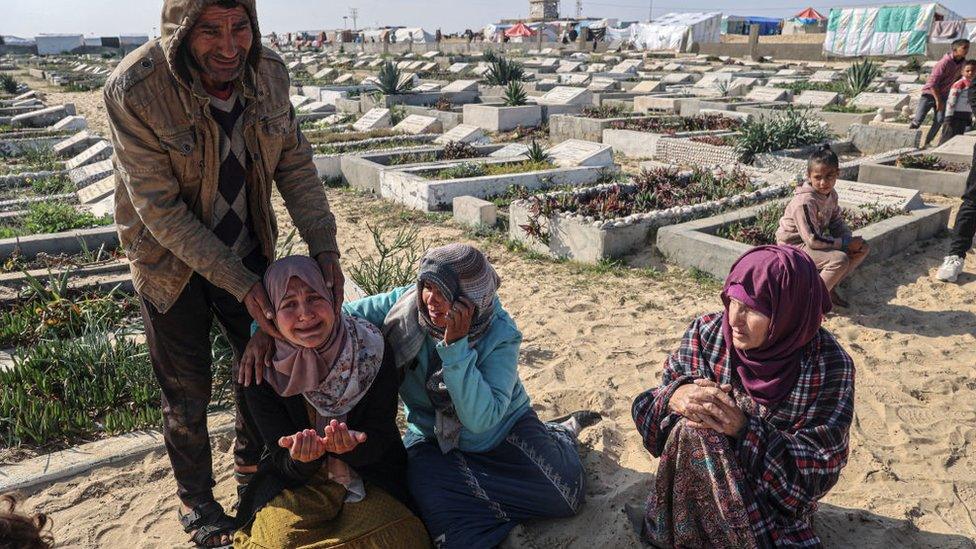Top Democrat Chuck Schumer calls for new Israel election as rift grows
- Published
Watch: Schumer calls Netanyahu 'major obstacle' to peace
US Senate majority leader Chuck Schumer has called for Israel to hold elections to replace Prime Minister Benjamin Netanyahu, as cracks appear in a once stable and friendly alliance.
Mr Schumer, the highest-ranking Jewish official in US government, said on Thursday Mr Netanyahu had lost his way.
Leaders in Washington have avoided directly criticising Mr Netanyahu's approach to the conflict in Gaza
It is a sharp escalation in US criticism of Mr Netanyahu's government.
Mr Schumer, who has backed Israel throughout his 25 years in the Senate, warned those casualties in Gaza risked turning Israel into a "pariah".
Speaking in the Senate on Thursday, Mr Schumer, a long-time supporter of Israel, harshly criticised the Israeli leader, who he said had come to allow "his political survival to take precedence over the best interests of Israel".
Israel, Mr Schumer said, must make "course corrections" and take steps to better protect civilians in Gaza.
Israel's leaders were quick to reproach the senator, with Mr Netanyahu's Likud party saying Israel is not a "banana republic" and that the prime minister's policies are "supported by a large majority".
"It is expected of Senator Schumer to respect Israel's elected government and not undermine it," the party said.
Israel's ambassador in Washington, Michael Herzog, also attacked the remarks, writing on X that it was "unhelpful" and "counterproductive" to comment on "the domestic political scene of a democratic ally".
The statement from one of America's most powerful political leaders come on the heels of pointed critiques from White House.
Washington leaders from both parties, including President Joe Biden, have mostly refrained from criticising how Mr Netanyahu has handled the conflict, which began when Hamas gunmen stormed into southern Israel on 7 October, killing about 1,200 people and taking more than 250 others hostage.
While the US remains Israel's closest ally and biggest provider of military aid, concerns have been mounting within the Biden administration and among some members of his own party over Israel's handling of the war.
Mr Biden, who is running again for the White House, is also facing political pressures in this presidential election year.
A coalition of Arab-American voters have organised successful protest efforts during the Democratic primary process, a sign of growing restlessness in the Democratic base about the situation in Gaza.
Cracks began to publicly emerge between the two governments recent weeks, with Mr Biden warning Israel against expanding its invasion into the city of Rafah, which he called a "red line".
In his State of the Union address last week, Mr Biden also called Israel's response in the territory "over the top".
After the speech, he was caught on a hot mic telling a concerned senator that he and the Israeli leader would soon have a "come to Jesus moment".
When alerted to the live audio, Mr Biden replied: "That's good."

And President Biden has become increasingly vocal in calling for Israel to let more humanitarian aid into the enclave, with "no excuses".
Nonetheless, the White House was quick to distance itself from Mr Schumer's comments on Thursday.
Spokesperson John Kirby said that while the Senate leader had a right to his opinion, administration officials were focused on working with Israel on its defence.
More than 30,000 Palestinians - the majority of them children and women - have now been killed in Gaza since 7 October, the Hamas-run health ministry said last month.
The actual number of dead is likely to be far higher as the count does not include those who have not reached hospitals, among them thousands of people still lost under the rubble of buildings hit by Israeli air strikes.
Mr Netanyahu said on Sunday that he could not accept the figure of 30,000. He said Israel's military had killed 13,000 Hamas fighters in Gaza and that it estimated the ratio of civilian deaths to combatant deaths was 1 to 1.5.
In his Thursday remarks, Mr Schumer said: "As a democracy, Israel has the right to choose its own leaders, and we should let the chips fall where they may.
"But the important thing is that Israelis are given a choice. There needs to be a fresh debate about the future of Israel."
"In my opinion, that is best accomplished by holding an election," he added. Israel is next due to hold a general election by October 2026.
For peace talks to advance, Mr Schumer said Palestinian Authority President Mahmoud Abbas, who is based in the occupied West Bank, must also step down. The Palestinian leader, who is 88, has been little seen throughout the conflict and his government has not held elections since 2006.
On Wednesday, Mr Abbas, who has been under pressure from the US to reform the Palestinian Authority, appointed his former adviser as prime minister.
Mr Schumer's comments prompted a rebuke from outgoing Republican Senate Leader Mitch McConnell, who called the 40-minute speech "grotesque" and "unprecedented".
He said it was "hypocritical for Americans who hyperventilate about foreign interference in our own democracy to call for the removal of a democratically elected leader of Israel".
Opinion polls show most Israelis support the war, but one survey released in January suggested just 15% of voters wanted Mr Netanyahu to remain in office once the conflict ends.
Meanwhile, the US revealed sanctions against three more settlers and for the first time against two Israeli settlement outposts it accused of undermining stability in the occupied West Bank.
There were nearly 500 Israeli settler attacks against Palestinians between 7 October and 31 January, according to UN figures.
The vast majority of the international community considers the settlements and outposts illegal under international law, though Israel and the US dispute this interpretation.
- Published12 March 2024

- Published14 March 2024

- Published29 February 2024

- Published12 March 2024
